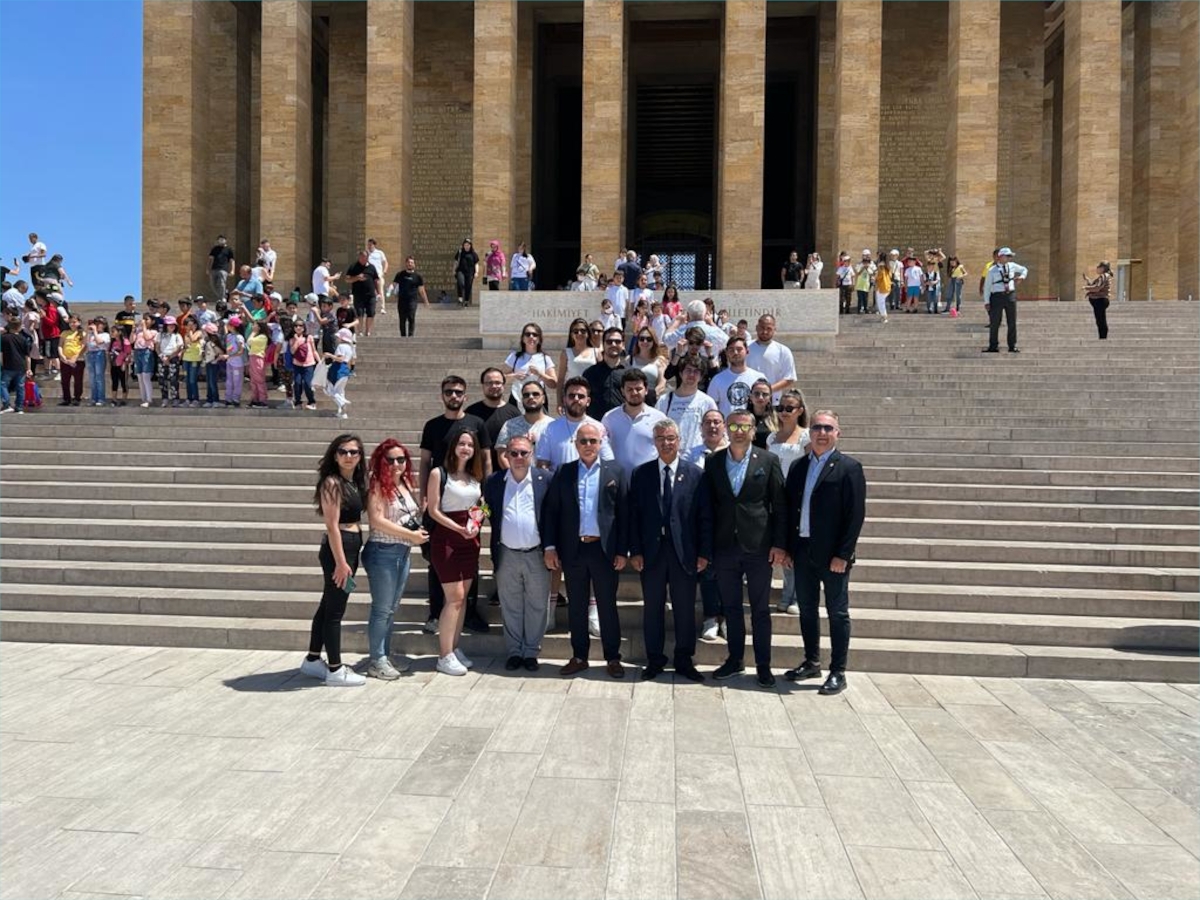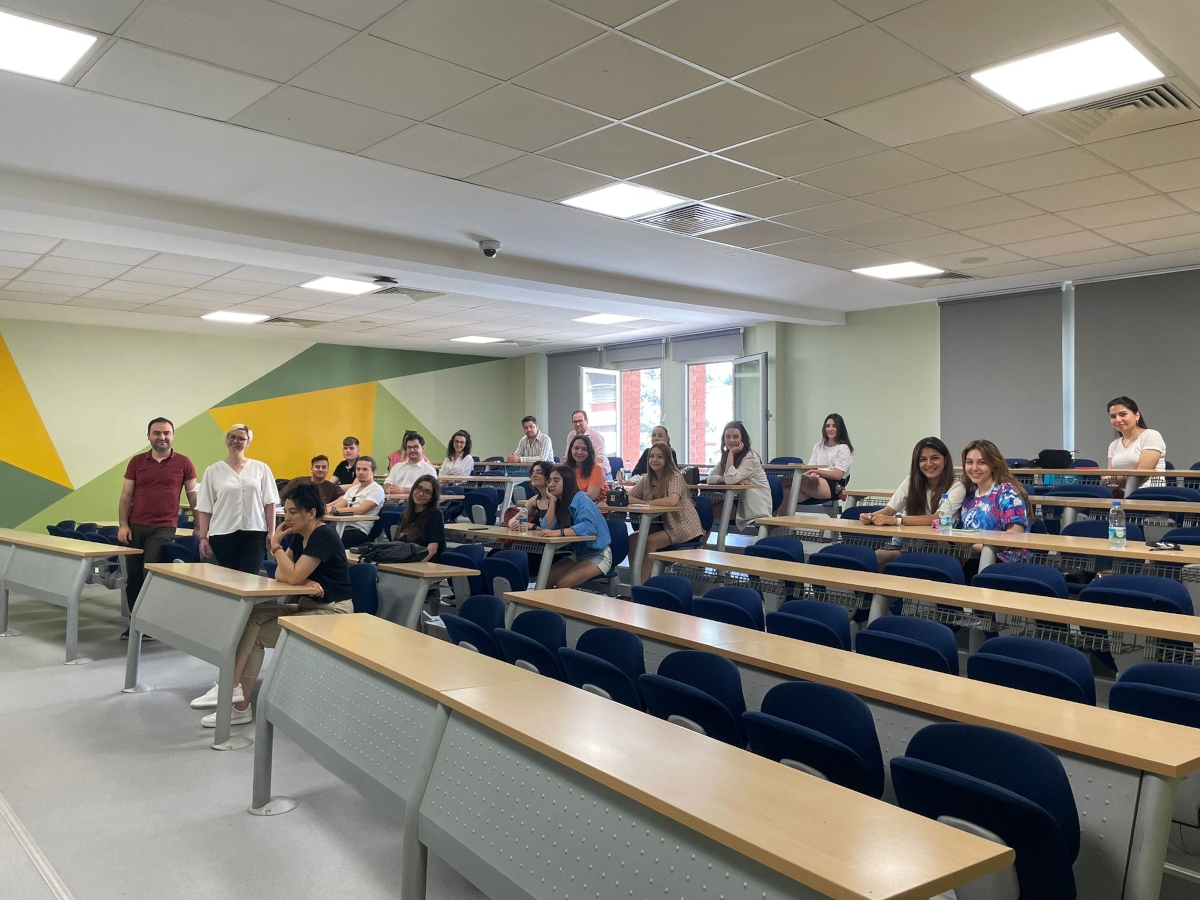
...

...

...
VOCATIONAL SCHOOL OF HEALTH SERVICES
Department of Opticianry| Course Name |
History and Philosophy of Science
|
|
Code
|
Semester
|
Theory
(hour/week) |
Application/Lab
(hour/week) |
Local Credits
|
ECTS
|
|
TS 230
|
Fall/Spring
|
2
|
0
|
2
|
3
|
| Prerequisites |
None
|
|||||
| Course Language |
Turkish
|
|||||
| Course Type |
Elective
|
|||||
| Course Level |
Short Cycle
|
|||||
| Mode of Delivery | - | |||||
| Teaching Methods and Techniques of the Course | DiscussionCritical feedbackLecture / Presentation | |||||
| National Occupation Classification | - | |||||
| Course Coordinator | - | |||||
| Course Lecturer(s) | - | |||||
| Assistant(s) | - | |||||
| Course Objectives | The aim of the course is; to gain knowledge about science, historical development of scientific thought, fundamentals of science and main problems of science. |
| Learning Outcomes |
The students who succeeded in this course;
|
| Course Description | This course will examine the theories about the methods and purposes of science, and their historical development. It will follow the development of science starting from Mesopotamian, Egyptian and Greek origins until today. |
| Related Sustainable Development Goals |
|
|
|
Core Courses | |
| Major Area Courses | ||
| Supportive Courses | ||
| Media and Management Skills Courses | ||
| Transferable Skill Courses |
| Week | Subjects | Related Preparation |
| 1 | Course introduction Introduction to the History and Philosophy of Science | |
| 2 | Definition and characteristics of science, philosophy of science, scientific method | F. Mason, Stephen, BİLİMLER TARİHİ, Çev. Umur Daybelge, Ankara: 2019, Türk Tarih Kurumu. S. 3-47 |
| 3 | Science in ancient times (Mesopotamia, Sumer) | F. Mason, Stephen, BİLİMLER TARİHİ, Çev. Umur Daybelge, Ankara: 2019, Türk Tarih Kurumu. S. 3-58 |
| 4 | Science in ancient times (Greek and Roman) | F. Mason, Stephen, BİLİMLER TARİHİ, Çev. Umur Daybelge, Ankara: 2019, Türk Tarih Kurumu. S. 3-58 |
| 5 | Science in the Middle Ages (Europe and Islamic geography) | F. Mason, Stephen, BİLİMLER TARİHİ, Çev. Umur Daybelge, Ankara: 2019, Türk Tarih Kurumu. S. 59-79 |
| 6 | Science in the Renaissance Period (Copernicus, Giordano Bruno, Galileo and Understanding of Heliosentric Universe) | F. Mason, Stephen, BİLİMLER TARİHİ, Çev. Umur Daybelge, Ankara: 2019, Türk Tarih Kurumu. S. 79-110 |
| 7 | Scientific Revolution in the 16th and 17th Centuries (Bacon, Descartes) | F. Mason, Stephen, BİLİMLER TARİHİ, Çev. Umur Daybelge, Ankara: 2019, Türk Tarih Kurumu. S. 111-148 |
| 8 | Midterm | |
| 9 | Science in the 18th century | F. Mason, Stephen, BİLİMLER TARİHİ, Çev. Umur Daybelge, Ankara: 2019, Türk Tarih Kurumu. S. 122-156 |
| 10 | Science and Biology in the 19th century | F. Mason, Stephen, BİLİMLER TARİHİ, Çev. Umur Daybelge, Ankara: 2019, Türk Tarih Kurumu. S. 245-274 |
| 11 | Science at 20th century | F. Mason, Stephen, BİLİMLER TARİHİ, Çev. Umur Daybelge, Ankara: 2019, Türk Tarih Kurumu. S. 379-400 |
| 12 | Scientific Method I-Analytical Tradition, Feyerabend | F. Mason, Stephen, BİLİMLER TARİHİ, Çev. Umur Daybelge, Ankara: 2019, Türk Tarih Kurumu. S. 487-577 |
| 13 | Scientific Method II-Kuhn, Popper | F. Mason, Stephen, BİLİMLER TARİHİ, Çev. Umur Daybelge, Ankara: 2019, Türk Tarih Kurumu. S. 487-577 |
| 14 | Recent scientific research (discussion) | |
| 15 | Semester Review | |
| 16 | Final Exam |
| Course Notes/Textbooks | F. MASON, Stephen, BİLİMLER TARİHİ, Çev. Umur Daybelge, Ankara: 2019, Türk Tarih Kurumu ISBN : 978-975-16-2709-4 |
| Suggested Readings/Materials | Yıldırım, Cemal, Bilim Tarihi, İstanbul:2005, Remzi Kitabevi, ISBN: 975-14-0341-6 Topdemir H. G., Unat Y. Bilim Tarihi ve Felsefesi, Ankara:2020, Pegem Akademi, ISBN: 978-605-241-998-4 Kuhn, S. Thomas, Bilimsel Devrimlerin Yapısı, İstanbul:2005, Kırmızı Yayınları, ISBN: 975-9169-08-8 Popper, Sağduyu Filozofu, Çev: Güzel Cemal, Ankara: 1998, ISBN: 975-7298-09-3 Lakatos, Çoğulculuğun Kuramcısı, Çev: Güzel Cemal, Ankara: 1999, ISBN: 975-7298-18-2 |
| Semester Activities | Number | Weigthing |
| Participation |
1
|
5
|
| Laboratory / Application | ||
| Field Work | ||
| Quizzes / Studio Critiques | ||
| Portfolio | ||
| Homework / Assignments |
1
|
20
|
| Presentation / Jury | ||
| Project | ||
| Seminar / Workshop | ||
| Oral Exams | ||
| Midterm |
1
|
35
|
| Final Exam |
1
|
40
|
| Total |
| Weighting of Semester Activities on the Final Grade |
3
|
60
|
| Weighting of End-of-Semester Activities on the Final Grade |
1
|
40
|
| Total |
| Semester Activities | Number | Duration (Hours) | Workload |
|---|---|---|---|
| Theoretical Course Hours (Including exam week: 16 x total hours) |
16
|
2
|
32
|
| Laboratory / Application Hours (Including exam week: '.16.' x total hours) |
16
|
0
|
|
| Study Hours Out of Class |
14
|
1
|
14
|
| Field Work |
0
|
||
| Quizzes / Studio Critiques |
0
|
||
| Portfolio |
0
|
||
| Homework / Assignments |
1
|
14
|
14
|
| Presentation / Jury |
0
|
||
| Project |
0
|
||
| Seminar / Workshop |
0
|
||
| Oral Exam |
0
|
||
| Midterms |
1
|
12
|
12
|
| Final Exam |
1
|
15
|
15
|
| Total |
87
|
|
#
|
Program Competencies/Outcomes |
* Contribution Level
|
|||||
|
1
|
2
|
3
|
4
|
5
|
|||
| 1 |
To have the required contemporary theoretical and practical knowledge in his/her field |
-
|
-
|
-
|
-
|
-
|
|
| 2 |
To use the material and technology related to his/her field, and make their maintenance, use the information and communication technologies at basic level |
-
|
-
|
-
|
-
|
-
|
|
| 3 |
To have the competency to recognize the problems in his/her field, analyze them, develop evidence-based solutions and have the ability to share their suggestions with others |
-
|
-
|
-
|
-
|
-
|
|
| 4 |
To be aware of legal responsibilities, conduct basic studies in her/his field independently |
-
|
-
|
-
|
-
|
-
|
|
| 5 |
To communicate with patients, relatives and colleagues properly, comprehensively, honestly and explicitly, transfer his/her thoughts and knowledge through written and oral communication |
-
|
-
|
-
|
-
|
-
|
|
| 6 |
To take responsibility as an active team member during the practices in his/her field |
-
|
-
|
-
|
-
|
-
|
|
| 7 |
To commentate and evaluate the scientific information with a critical approach by the help of knowledge gained in his/her field |
-
|
-
|
-
|
-
|
-
|
|
| 8 |
To comprehend the importance of lifelong learning, to determine and meet her/his learning needs, to develop herself/himself by monitoring the development in science and technology |
-
|
-
|
-
|
-
|
X
|
|
| 9 |
To act by considering the universal ethical values, social and cultural characteristics |
-
|
X
|
-
|
-
|
-
|
|
| 10 |
To know the concepts of occupational safety, patient safety, environmental protection and quality, and fulfill the requirements |
-
|
-
|
-
|
-
|
-
|
|
| 11 |
To be able to follow information in his field and communicate with colleagues in English at least a level of European Language Portfolio A2 General Level |
-
|
-
|
-
|
-
|
-
|
|
| 12 |
To have knowledge and skills related to the administrative responsibility and management of an optician’s store |
-
|
-
|
-
|
-
|
-
|
|
| 13 |
To monitor visual health related products, determine the needs of the optician’s store and carry out activities for development |
-
|
-
|
-
|
-
|
-
|
|
*1 Lowest, 2 Low, 3 Average, 4 High, 5 Highest

...

...

...

As Izmir University of Economics transforms into a world-class university, it also raises successful young people with global competence.
More..Izmir University of Economics produces qualified knowledge and competent technologies.
More..Izmir University of Economics sees producing social benefit as its reason for existence.
More..